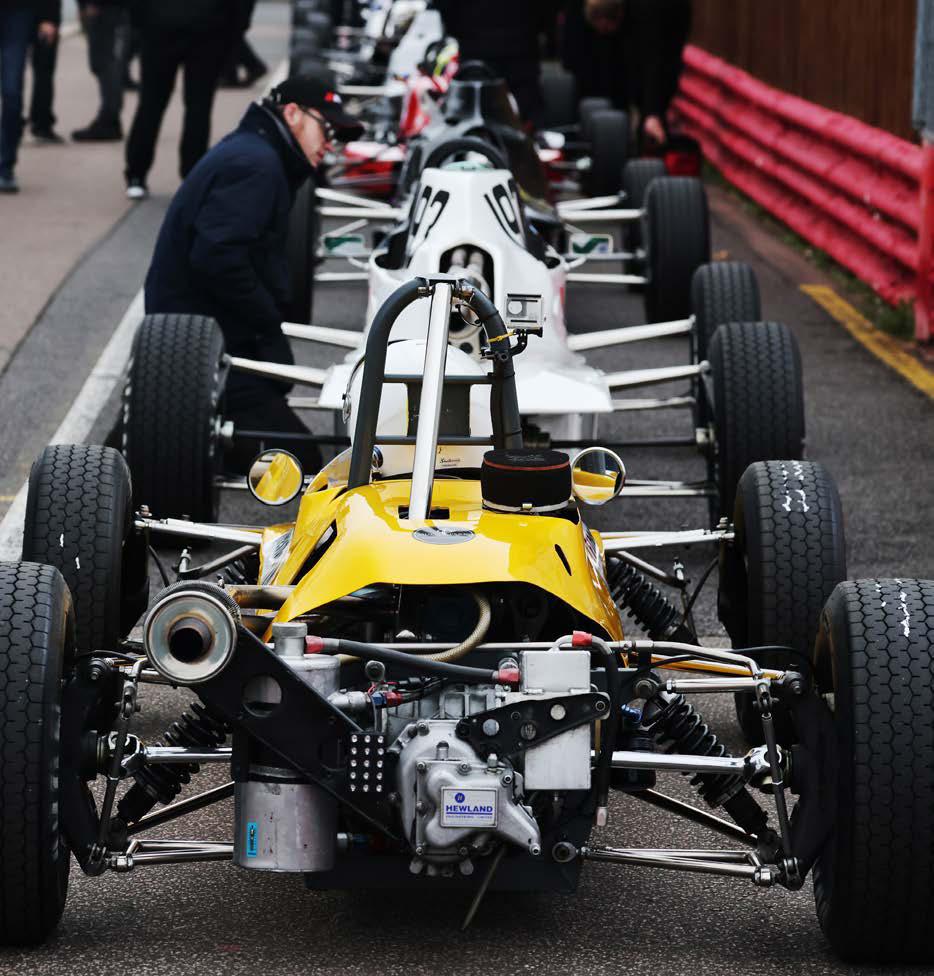18 FEBRUARY 17 2022 motorsport-news.co.uk
Advertising enquiries: 01732 446757
FEATURE What makes a good clerk? “You need to have an eye for detail, you need to understand the sport, you need to understand customer service because the majority of racing in the UK the people driving the cars are paying to be there,” British GT race director Peter Daly explains on what you need for that kind of race control role. “Concentration is key as well. I have worked in the past going back many years ago with people who had a tendency to lose concentration particularly in longer races.” Clerk Doug Ellwood adds: “You have to
have the right mindset about it, it’s not for the faint hearted.” Daly also outlines something to avoid. “The sort of people we’re not looking for are people who are there to try and catch people out. I would liken it to the oldfashioned policeman, [they] were there to help if you needed help, and if you didn’t obey what they were asking you to do then they would be there to fill in the charge sheet, but be very fair about it.” Clerk Andy Green takes a similar view: “What you don’t want is the personality of a clerk which is like a headmaster. Maybe
20 years ago that was the style, now it’s much more about listening to the drivers and guiding them and coaching them in terms of the regulations.” And for Daly there’s a bottom line: “You want people whose passion is the racing. The most exciting time for me at a British GT weekend is Saturday afternoon qualifying, we’re all watching the monitors to ensure it’s safe but we [also] get excited by watching the shootout for pole position. I like to work with people who are interested in the race as opposed to people who are looking for transgressions all the time.”
All were kept waiting 45 minutes at last year’s Walter Hayes Trophy as judicial appeals were resolved volunteers and there are people doing multiple roles which is difficult. “The other element is that I’m upstairs looking out, the only method of communication I have with drivers is flags and maybe a gantry with lights on it. A lot of drivers don’t know the rules particularly well and I think there is a place in ARDS testing for the basics of track rules to [have] far more emphasis.” As noted, another area of criticism is in safety cars causing chaos in a race by not picking up the leader. “Where it gets difficult is if everybody dives for the pits,” Green notes, “then the safety car’s going round with nobody behind it and everybody says that looks stupid. In British GT and stuff like that you can talk to the drivers, but in club racing you don’t have that ability. “A lot of the championships that run these endurance races would like to have some rules around closing the pit window when you’ve gone safety car, but that gets even more complicated because how do you tell the driver who’s about to scream into the pits
that you’ve just closed the pit?” Ellwood adds: “At a circuit like Brands Hatch you’re typically looking at a 50-second lap time, so if you hang around for 10 or 15 seconds, 20 seconds, the cars are halfway around the lap, time is of the essence. “Actually if you read the Motorsport UK guidance about employment of the safety car there’s no requirement to put a safety car out in front of the leader. We try to, but the overall requirement is to get control of the race traffic so that incidents can be handled safely.” There have been recent criticisms of the apparently slow-moving judicial process too, such as in last November’s Walter Hayes Trophy with a 45-minute wait for the final to start as appeals, potentially impacting the final’s grid order, were resolved. Motorsport UK’s CEO Hugh Chambers, present that day observing, defends the officials though. “At no time is anybody [in race control] mindful of anything other than trying to get racing going again,” he tells MN. “There are very often things that are
“Officials’ difficult job doesn’t always get recognised” Many things hold up a meeting...
Hugh Chambers
happening behind the scenes which the competitors and the teams and the paddock are not aware; there are certain things that have to be done in the right order and evidence needs to be produced.” Green illustrates what can also happen in the modern age: “I’ve been in a situation [where] we’ve had 27 Caterham drivers all in race control all holding their SD cards [with onboard footage] because of multiple incidents and it just takes time to find the footage. “The risk for the clerk is if you take a judicial decision and it’s appealed and they then bring new evidence that you haven’t found, the clerk can look incompetent. Whereas the clerk actually has probably taken every reasonable action but just wasn’t aware of this other angle from a car three cars behind. “We have to be open to finding ways to improve and to look at GoPros quicker, because all of these cameras have different software which makes life a bit more complicated.” Officials also are volunteers, giving up weekends so people can race, and this is something those involved believe is not always recognised sufficiently. “At times maybe there isn’t the visible recognition of the difficult job that a lot of our officials have to do,” says Chambers, “and I think we should all remember that these people are giving up their own time to deal with often very high-pressured situations and to do it in a way that is safe and is fair. “There’s no question that anecdotally people do feel a little bit browbeaten at times and that’s not conducive for people wanting to carry on and do this on a voluntary basis.” n
Do racers need to know more about what happens behind scenes?
How do you get involved? Motorsport UK has an officials’ pathway to attract, develop and evaluate officials. And clerks in their development get paired with an experienced official at race meetings, gradually getting more responsibilities up to the point that Motorsport UK can assess them for approval of their licence. “We are always looking for new members,” says British Racing and Sports Car Club chairman Peter Daly. “They’re [trainees] now called assistant clerks, and we then buddy them up with more experienced people. For example my [British GT] race
control assistant for the last two years will [now] be going to a lot of club meetings to actually run races.” Clerk Doug Ellwood recalls: “I went along for a taster day or two. You have to demonstrate that you know the rules and then take on more responsibility, but always under oversight of a qualified clerk. Last year we had a lady who’s training to be a clerk and we got her to do her first drivers’ briefings, but with a qualified clerk there. Likewise you have a ‘straightforward’ judicial decision then a trainee clerk can start to handle those although always under the supervision of
a qualified clerk.” Daly reckons there’s a benefit on offer too. “You’re actually enhancing the value of your professional CV because you’re learning an awful lot of skills that you might not get at work. “I run a business [and] there’s a lot of things that I bring from business into race control and there’s a lot of things that I take from race control back into my business. “It’s great for people in their CV that they can prove they can work within a team and deliver crisis management. Because at the end of the day being a clerk of the course is also part of crisis management.”






